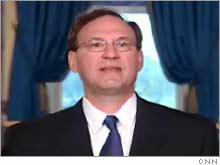 |
 |
| Samuel A. Alito Jr. has been called pro-business |
|
|
|
| On the docket
|
| Three cases before the Supreme Court could change the landscape for joint ventures, manufacturer discounts. (Full story)
|
|
|
|
NEW YORK (FORTUNE) -
Just hours after President Bush nominated Samuel A. Alito Jr. to the U.S. Supreme Court, the predictable rush to judgment began. Pro-life leaders called Alito a fast train to a world without Roe v. Wade. Liberals called him an opponent of fundamental rights and protections.
As for business, the verdict was unanimous. "Business wins," said Ted Frank, a fellow at the American Enterprise Institute. A magazine headline read, WHY BIG BUSINESS LIKES ALITO. And the New York Times wrote that Alito had "reliably favored big-business litigants." Labels stick -- Sam Alito is "pro-business."
This tells us something about journalism (it's hungry for predigested opinion) and about advocacy groups (they view judicial nominations as fundraising opportunities). It just doesn't tell us much about Alito.
The 55-year-old judge, as it happens, is not an easy man to pigeonhole. He has written more than 240 decisions in 15 years on the U.S. Court of Appeals, thereby ensuring that by cherry-picking or misreading cases, anyone can prove just about anything about him.
The wrong question
To ask whether Alito is pro-business is to pose the wrong question. Why? Because many business cases on the Supreme Court's docket pit one company against another. The same goes for cases decided by Alito.
Alito's pro-business label stems, in part, from a record of consistently backing companies in employment and discrimination cases.
"Judge Alito probably has not marched in many Labor Day parades," says William W. Osborne Jr., a prominent Washington labor lawyer. In Sheridan v. E.I. du Pont, for instance, Alito was the lone dissenter when a panel of judges decided by a 10-1 vote that a woman who was fired from her job at the Hotel DuPont in Wilmington did not have to show direct evidence of sex discrimination to win her claim.
But in other arenas where the stakes are high for business, Alito is less predictable. His record on the environment, while thin, shows he voted to make it harder for citizens to sue polluters -- but he also supported clean-air rules and coal-mining regulations that were opposed by business.
In a shareholder class action suit, Alito's opinion came down on the side of the company, but in a nuanced way. "It suggests that he's not particularly hostile to securities plaintiffs and many judges are," says David Hoffman, who teaches corporate law at Temple University.
On one big issue, Alito has staked out a conservative position: how to apply a provision of the Constitution known as the Commerce Clause, which gives Congress the power to regulate interstate commerce. Supreme Court judges have debated its meaning since the 1930s.
In a 1996 dissent, Alito argued that a federal firearms law that prohibited the possession of machine guns was unconstitutional because mere ownership of a gun did not implicate interstate commerce. Judicial conservatives, who want to limit government's powers, applauded.
If Alito's view prevails, laws such as the Endangered Species Act and the Clean Water Act might not hold sway. The Supreme Court agreed last month to hear two Clean Water Act challenges brought by Michigan property owners who say the federal government has no right to regulate local wetlands. Environmentalists say the case is their most important Supreme Court case in years.
You might think that business would cheer when judges support property rights over environmental regs. But big companies, at least, often prefer federal to state regulation. "The last thing manufacturers want is a Balkanized market where you have inconsistent or conflicting regulations," says Hank Cox of the National Association of Manufacturers.
Conservative may not mean pro-business
That is not the only place where the business establishment and judicial conservatives part company. On the issue of punitive damages, a top concern of business, there is disagreement as well. Here, Alito's record is skimpy. In 1995 he wrote a majority opinion that struck down a $3 million punitive-damage award to a distributor of Amana refrigerators because the jury had found that no actual damages had occurred. That was, however, a relatively easy call; all three appellate judges agreed.
Since then, the Supreme Court has twice struck down punitive-damage awards made by state courts. But both cases drew strong dissents from odd bedfellows. Two conservative justices, Antonin Scalia and Clarence Thomas, and Justice Ruth Bader Ginsburg, a liberal, argued that the Constitution does not permit federal judges to limit punitive damages.
Corporate lawyers would be dismayed, to say the least, if Roberts and Alito shared their view. "There are series of issues where a principled commitment to a conservative judicial philosophy does not lead to a pro-business outcome," says Donald B. Verilli Jr., a Washington lawyer who frequently argues before the Supreme Court.
Of course, there's a danger in trying to extrapolate any judge's future from his past. When Abraham Lincoln appointed Salmon P. Chase the Chief Justice in 1864, he said that he wanted a judge who would uphold the legality of "greenbacks," money not backed by silver or gold, that had enabled the North to finance the war.
As Lincoln's Treasury Secretary, Chase had written the laws. Three years later Chase wrote an opinion holding that the greenbacks were unconstitutional.
Read the complete story on FORTUNE.com.
More from FORTUNE:

|